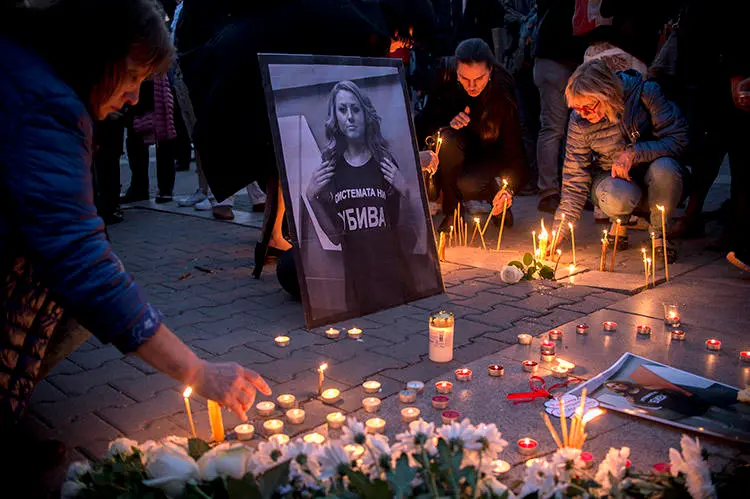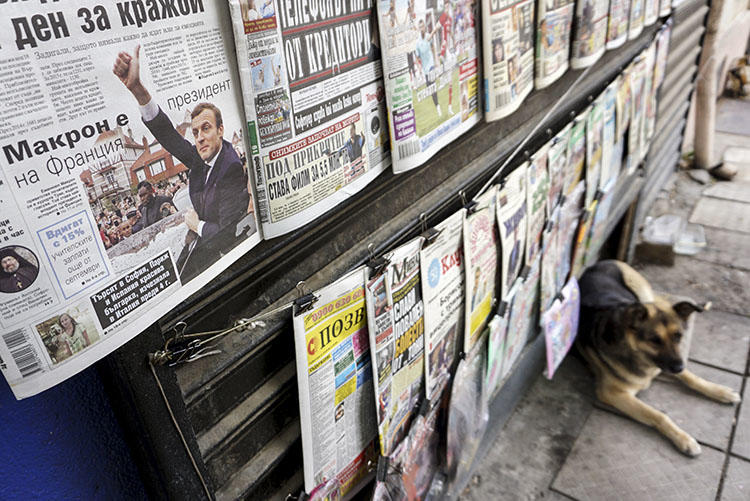In October 2018, Viktoria Marinova, a host for TVN, was raped and murdered near the station’s studios. When CPJ’s Europe correspondent, Attila Mong, spoke with her colleagues and other journalists during a trip to Bulgaria last month, they said that while they don’t believe the attack is linked to Marinova’s work, it has highlighted the dangers and pressures for investigative reporters.
Crammed in the small studio of TVN, a regional station in Ruse, north eastern Bulgaria, journalists share stories about their colleague, Viktoria Marinova. Barely six months ago, Marinova was raped and murdered not far from the station, while jogging on the banks of the Danube. Her colleagues still struggle to accept the loss, but they all agreed that Marinova, who presented mainly lifestyle shows, was not killed because of her journalism. “This is just a tragic coincidence,” said Ioanna Angelova, the chief editor of TVN.
Marinova’s closest colleagues and ex-husband, Svilen Maximov, who owns the TV station and an internet provider in the region, told me they thought that the investigation was professional, and agreed with the prosecutor’s assessment that it was not motivated by her work. However, some journalists said they think there were unanswered questions. [Editor’s note: Read more about Marinova’s case here.]
Their skepticism is perhaps understandable in an environment where investigative reporters are harassed, threatened, or subjected to smear campaigns, and where, according to EU polls, 70 percent of people do not trust law enforcement and the judicial system.
“You don’t need to kill or physically attack a journalist here in order to achieve your goals, there are broader, more systemic threats to press freedom,” said Boryana Dzhambazova, a freelance journalist and member of the Association of European Journalists–Bulgaria. Genka Shikerova, an investigative journalist for a national privately owned station, Nova TV, said, “The situation is getting so much worse, that whatever happened, we simply wanted to believe she was killed for her reporting.”

A few days before her death, Marianova hosted “Detektor,” which was intended to be a weekly flagship news program for TVN. The show aired just once–on September 30–broadcasting an interview with Bulgarian and Romanian investigative journalists who were briefly detained by the Bulgarian police while looking into allegations of fraud involving EU funds. “Viktoria was the face of the show, but the interview was my idea and I recorded it,” her producer, Ivan Stefanov, said. “If somebody could have been killed, that is me.”
I met one of the show’s guests–Bivol reporter Dimitar Stoyanov–in a secure location in downtown Sofia, rather than at the outlet’s offices. The location of Bivol‘s premises remains unknown to outsiders “for security reasons,” Stoyanov said. He told me that in Bulgaria, the threat of physical violence is considerably greater for local journalists and reporters like their team members, who work outside the country’s big media companies.
The experiences of Georgi Ezekiev, the publisher of Zov News in Vratsa, backs up that view. His outlet published a joint investigation with Bivol in 2017 that implicated police officers in an alleged drug trafficking ring. Afterwards, he said, he and the chief editor Maria Dimitrova were threatened on social media and in text messages, and someone destroyed his car tires.
“One morning, I discovered that the entrance of my house was decorated as a funeral home with flowers, which was clearly a threat,” he said. On November 22, 2017, Bivol published video of man who was allegedly part of the ring, telling the reporters that his former mafia bosses were planning to eliminate Ezekiev. The publisher said that police denied the allegations made in their report.
“There is a real threat of physical violence for journalists who dig into possible links of between organized crime, law enforcement and politics,” Ezekiev said.
A June 2018 statement from Bulgaria to the Council of Europe’s platform to promote the protection of journalism and safety of journalists said that the Vratsa district prosecutor’s office rejected Ezekiev’s and Dimitrova’s complaints. In Ezekiev’s case, the prosecutors ruled that the messages he received “could not in any way be classified as a threat,” and in Dimitrova’s case, “the collected data does not prove that there is threat of murder … the messages contain only obscene words and insults and not threats to her or her relative’s lives or health.”
A spokesperson for the prime minister’s press department did not immediately respond to CPJ’s emailed request for comment.
Despite the risk of threats and harassment, not all investigative journalists are deterred. Sofia was abuzz during my visit with details from a joint investigation by the Bulgarian branch of the U.S. government-funded Radio Free Europe-Radio Liberty (RFE/RL) and local non-governmental organization, the Anti-Corruption Fund. In a scandal referred to as “ApartmentGate,” the outlets reported on allegations that at least six politicians and civil servants with links to the ruling GERB party had bought luxury flats for below-market prices. The story resulted in Bulgaria’s prosecutor-general launching an official investigation, and four politicians resigning. [They all denied wrongdoing, the Financial Times reported.]
Prime Minister Boyko Borissov said during a press conference on April 8 that the reports proved, “We have absolutely free media. Nothing is left hidden, no matter who is involved.”
However, local journalists pointed out that is it easier for those working for foreign-funded outlets to take on such investigations.
“We have the resources and the freedom to investigate, which is not the case for most of the Bulgarian media outlets,” said Ivan Bedrov, director of RFE/RL’s Bulgarian service. Bedrov said that with the exception of four to five newsrooms, most lack either the freedom or the resources. Bedrov received me in their office, an apartment in a quiet street in downtown Sofia. “No insignia, just come upstairs,” he told me. When I asked whether they needed to remain hidden, he responded, “Better to be cautious.”
Bedrov told me that after the story was published, they were targeted by a smear campaign in pro-government media that tried to discredit the reporting by presenting conspiracy theories that the journalists were American agents, or that Russians had infiltrated the American-funded organization to attack the Bulgarian government.
When I met Polina Paunova, the investigative journalist who uncovered the scandal, however she seemed relaxed, greeting me with a broad smile. On a cafe terrace in Sofia, overlooking the president’s office and a little further up, the government building, she explained that such an investigation would have been impossible in a purely Bulgarian-funded media outlet. “You need grants and independence,” she said, arguing that conditions for free reporting have largely deteriorated in recent years. She said she doubted that the judiciary investigation would come to anything “Finito,” she said bitterly, adding that she thinks the case will soon die out as most scandals do.
“The ApartmentGate is a unique case and a lucky coincidence,” said Konstantin Pavlov, a sociologist and researcher at Sofia University. Had it not been for European Parliamentary elections in May, local elections in autumn and the relaunch of RFE/RL, he said, the implications of the scandal could have been different. “The story has quickly become too big to conceal and the government could not control anymore,” said Pavlov. Big commercial stations picked up the story and even pro-government media outlets covered the political reactions, he said. However, he said, most Bulgarian media are owned by businessmen who buy outlets not as a financial investment, but to buy favors with the political elite, and journalists working for such outlets may follow their owner’s wishes to keep their jobs. “This is an oligarchic pluralism, at best,” said Pavlov.
A lack of media plurality was highlighted in a 2018 report by the non-governmental organization, Union of Publishers in Bulgaria. Its “White Paper on Media Freedom in Bulgaria” detailed how a conglomerate that it referred to as the “Peevski media empire,” controls an array of national and regional newspapers, television channels, news portals, publishing house, digital television broadcast, and 80 percent of the newspaper distribution market. It is controlled by Delyan Peevski, the former head of the intelligence services and MP for the Movement for Rights and Freedoms (DPS), an opposition party that mostly support the government, as does his media empire, according to the White Paper.
CPJ sent an email to Peevski for comment through the press department of the DPS and his parliamentary office, but did not immediately receive a reply.
Another challenge for the independent media is smear campaigns. Ivo Prokopiev, publisher of the weekly Capital and the daily Dnevnik, is a regular target of what he and international organizations including the OSCE have described as administrative harassment: record fines for investigative reporting into financial irregularities, ramped up investigations into the publisher’s business dealing, and authorities freezing his assets.
Rossen Bossev, an investigative journalist for Capital, told CPJ that his weekly is often qualified as “fake news” by pro-government newspapers, and that smear campaigns target him and his family, referring to him as an anti-Bulgarian conspirator or U.S. agent. “Sometimes I feel like a most wanted criminal in the country,” he said, smiling as he recalled how the police showed up one Saturday morning last year at Capital’s newsroom, with a subpoena related to an ongoing defamation lawsuit.
Irina Nedeva, the president of the Association of European Journalists in Bulgaria, told me the that the country was experiencing “the gradual return of political pressure, the type of pressures which characterized Bulgaria, during the 1990s, the early transition years from communism to democracy.” A 2017 report by the association highlighted pressures from owners and advertisers, and found that 26 percent of journalists admitted to restricting their criticism toward the government and the powerful to satisfy owners. “We expect that our upcoming report in 2019 will record deteriorating conditions,” said Nedeva.
[Reporting in Sofia, Ruse]
Editor’s Note: This text has been updated to correct the spellings of Polina Paunova and Rossen Bossev’s names.
